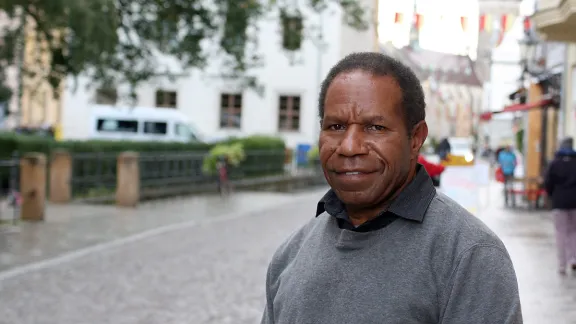
Bishop Jack Urame, Evangelical Lutheran Church of Papua New Guinea. Photo: LWF/A. Weyermüller
Bishop Jack Urame (ELCPNG) looks back on the Retreat of Newly Elected Leaders
(LWI) – Jack Urame (49) was elected Head Bishop of the Evangelical Lutheran Church of Papua New Guinea in January 2016 and serves a four-year term in this position with the option of being re-elected once. He was installed in March 2016.
In an interview with the Lutheran World Information he shares insights into the challenges faced by his church, his leadership experiences and insights gained during the Retreat of Newly Elected Leaders. This retreat of The Lutheran World Federation (LWF) took place in Geneva, Switzerland, and Wittenberg, Germany, from 7 to 16 September.
Bishop Urame, please tell us something about the context you and your church live in.
Papua New Guinea is a former German colony which was taken over as mandated territory by Australia after the First World War. In 1975 our country gained its independence in a peaceful process.
The Lutheran church in Papua New Guinea also has German roots, namely in the mission work of Neuendettelsau in Bavaria – we still have a partnership with them today. The church has grown to about 1,5 Million people and is the second largest church in the country, after the Roman-Catholic church.
I have the function of Head Bishop over 17 districts with about 1,000 pastors. It is common practice that the congregations take care of their pastor or that the pastor has another profession with which to earn his living. I myself used to be a teacher. Once I finished my theological studies I worked at the Melanesian Institute for Pastoral and Economic Services, an ecumenical institute doing social and cultural research for the churches.
What are some of the major issues you are dealing with in your church?
On the one hand society in Papua New Guinea is very traditional with people relying on agriculture to sustain them. Patriarchal social groups and tribes are widespread. On the other we had a high influx of new technologies, particularly in the mining industry, and neo-capitalism. Cities have developed where people must find new ways of interacting with one another. One of the ways of doing this is to establish new congregations.
During my work at the ecumenical institute we did research on topics still relevant today. Sorcery, Witchcraft and Christianity is one of them. It strives to bring to light problems following from accusations of sorcery and witchcraft in Papua New Guinea.
Another is The Politics of Give and Take which echoes the views that the way Papua New Guineans appoint their leaders, and the way those leaders conduct themselves is still strongly influenced by the traditional “culture of reciprocity” and by very local interests.
The Lutheran church has numerous schools around the country and we did a study on inclusive education which is official policy. The goal is to have pupils with and without disabilities go to the same schools. Those with disabilities are accompanied by special educational staff.
All in all, the church gives recommendations to the government on many issues. Whether they are taken up is not always up to us. However, we have been successful in advocating against the introduction of the death penalty and against plans to take up deep sea mining activities.
The general challenge for church leaders is to provide good leadership to help grow a healthy church. That is a church that takes up theological and social issues in responding to the needs of the people. God’s word must relate to contemporary issues – it must be relevant and meaningful. And it must move people to act.
How did your church commemorate 500 years of Reformation?
This year of Commemoration is a time of deep reflection and a time to ask critical questions about God, about ourselves and about how we can live together as a global community. We need to take up Luther’s ideas about grace, about inequality etc. and make them relevant for today.
When I visit the North, I find that a lot of attention is given to the historical aspects of the Reformation. In Papua New Guinea people identify with Luther not so much as a historical person but rather as a concept or idea of being. “I am Lutheran because of Luther” is the way we would say that in my context. It is like a blood relationship.
What are your personal highlights from the Retreat of Newly Elected Leaders in Wittenberg and Geneva?
I have gained a deeper understanding that I am not alone and the Lutheran Church of Papua New Guinea is not alone – that is very encouraging.
I have also come to realize that bishops in other parts of the world have the same challenges as we have in Papua New Guinea. We all face challenges is the pastoral ministry. We all need to improve theological education, also for lay people.
When we have the same challenges, we could possibly also find adequate responses together.


